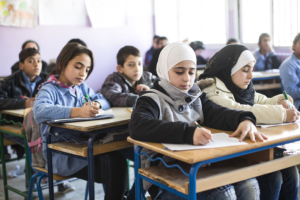Refugee Education in Germany
 In 2015, conflict in Syria, Afghanistan, Iraq, Libya and other places forced millions of people to leave their homes and become refugees. The flow of migrants entering Europe increased from 153,000 in 2008 to more than a million in 2015.
In 2015, conflict in Syria, Afghanistan, Iraq, Libya and other places forced millions of people to leave their homes and become refugees. The flow of migrants entering Europe increased from 153,000 in 2008 to more than a million in 2015.
Education Opportunities for Refugees
During what is known as the “refugee crisis” of 2015, Germany quickly developed a culture of openness, with an emphasis on refugee education. Angela Merkel, then the country’s chancellor, introduced the phrase “Wir schaffen das” (“We can do this”) as a rallying call for the more skeptical citizens of Germany. There were many Germans at the time who doubted the capacity of the welfare state to accommodate such high numbers of new arrivals on top of the demands of the native population. However, the story of Germany’s refugee policy is considered to be one of success today. By 2018, 72% of the asylum seekers had been granted protection and the right to work in Germany. By 2020, half of the asylum seekers who had entered Germany in 2015 had found a job.
One of the central strategies Germany has adopted for accommodating and integrating its migrant population is an investment in education opportunities for refugees. According to the World Bank, there are 15 million displaced school-aged children, more than half of whom are not enrolled in education. If these children were in school, they would be less vulnerable to rights abuses like child labor, forced marriage and violence. Additionally, the consistency of attending school every day in a safe and supportive environment can restore a sense of stability and safety to children who have experienced severe trauma and life disruption.
Barriers to Integration in Germany’s Education System
Although it has been widely recognized that “access to education and language courses are … key to the success of social and labor market integration”, the German schooling system was not designed with this intention in mind. Studies have shown that the German schooling system tends to reproduce and cement already existing social and class distinctions. It can be difficult, therefore, for refugee children to move beyond the social class of their parents, even with a German education. One report cites the fact that frequent relocations in accommodations and being enrolled in a preparatory class separate from native German speakers correlated with a lower chance of gaining further qualifications after completion of the mandatory nine years.
The German Expert Council on Migration and Integration released a report in 2018 suggesting that a barrier to social integration and educational advancement of refugee children is the segregated school system. Some schools implement a parallel schooling system, in which refugee children are taught separately from their German counterparts, sometimes without any native speaker in the classroom. When it came to higher education, refugees again faced considerable barriers. Without institutional provisions like scholarships or waived costs, it was largely the work of volunteers and people working within academia that turned Germany into an example of inclusion when it comes to refugee education. There was a large consensus across academic disciplines that federal funding should be opened up for asylum seekers in Germany.
Looking Forward
Humanitarian organizations filled the gaps where federal policy failed to account for refugee education. An important example of this humanitarianism is the charity Kiron. The charity began its work in 2015, ensuring that forcibly displaced people can continue to access education online. Kiron has now provided remote education for more than 100,000 students since its founding. In 2023, it launched the free program THRIVE, aimed at upskilling displaced women in preparation for the job market.
Additionally, the United Nations High Commissioner for Refugees (UNHCR) has committed to enrolling 15% of refugees in higher education by 2030. Achieving this goal will require efforts from not only humanitarian workers but also governments to ensure inclusive education.
– Io Oswald
Io is based in Paris, France and focuses on Politics for The Borgen Project.
Photo: Flickr
